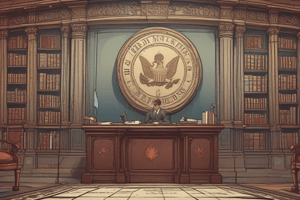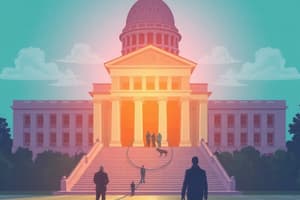Podcast
Questions and Answers
What is the main purpose of a bureaucracy in government?
What is the main purpose of a bureaucracy in government?
- To centralize decision-making power in a few individuals
- To provide specialized knowledge in public affairs management (correct)
- To promote political patronage among federal workers
- To ensure equal representation for all citizens
Which of the following best describes a decentralized model of bureaucracy?
Which of the following best describes a decentralized model of bureaucracy?
- All decisions are made by the highest authority
- Decisions must pass through multiple layers before implementation
- Decisions are made solely by external consultants
- Decision-making power is spread throughout the organization (correct)
What was the primary aim of the United States Civil Service Commission established after the Civil War?
What was the primary aim of the United States Civil Service Commission established after the Civil War?
- To abolish all bureaucratic structures
- To increase political patronage in government positions
- To protect federal workers from political patronage (correct)
- To eliminate federal workers' rights
How does a bureaucracy provide services to citizens in need during a police emergency?
How does a bureaucracy provide services to citizens in need during a police emergency?
Which function does the government department devoted to processing tax applications perform?
Which function does the government department devoted to processing tax applications perform?
What is one of the key roles of bureaucracies in policy-making and regulation enforcement?
What is one of the key roles of bureaucracies in policy-making and regulation enforcement?
Flashcards are hidden until you start studying
Study Notes
Bureaucracy is an administrative organization found in various forms across many countries around the world. It refers to the system of administration within government by which people with specialized knowledge manage public affairs on behalf of the citizens they serve. There are several different models of bureaucracy, each implemented based on the needs and circumstances of the country it's used in. These different models can range from being very hierarchical, where decisions must pass through multiple layers before reaching those who make them, to more decentralized models where decision-making power is spread throughout the organization.
One specific example of a model of bureaucracy is the United States Civil Service Commission, established under President Grover Cleveland after the Civil War to protect federal workers from political patronage. This commission was critical in creating rules for hiring, firing, pay raises, promotions, removals, grievances, and performance standards among employees.
A key function of any bureaucratic structure is providing services to citizens. For instance, when we call in a police emergency, there is often a chain of command that takes our calls and puts us into contact with a member of the force; if you file your taxes online, the government has a whole department devoted to processing and reviewing these applications. Another important role of bureaucracies is setting policy and making sure its regulations are followed. In the U.S., this is done largely through executive orders, but agencies also set their own policies to implement laws passed by Congress.
Bureaucracies exist to help ensure efficient delivery of goods and services to the population. Without some kind of orderly process—some sort of structure that manages all the work that needs doing—there would simply be chaos. Bureaucracy provides a framework and system in which everyone knows what's happening, and how tasks get accomplished.
Studying That Suits You
Use AI to generate personalized quizzes and flashcards to suit your learning preferences.




